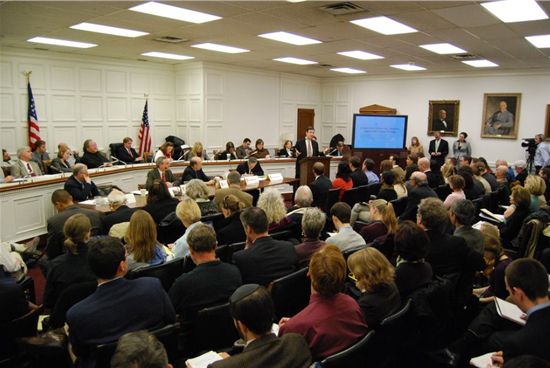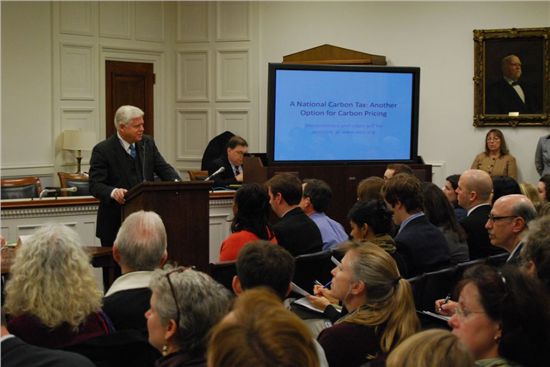Purpose
- Investigates the causes of economic imbalances.
- Investigates the effect of the global financial system and/or the monetary system in fostering a sustainable economy.
- Investigates causes tending to destroy or impair the free-market system.
- Explores and develops market-based solutions.
Summary
The Environmental Law and Policy Center (“ELPC”), in conjunction with the Carbon Tax Center (“CTC”), is analyzing the economic impacts and efficacy of the major market-based (carbon-pricing) mechanisms for stabilizing and reducing emissions of greenhouse gases: cap-and-trade systems and revenue-neutral taxes. Our analysis utilizes the nine-state region in ELPC’s charter: Illinois, Indiana, Iowa, Michigan, Minnesota, North Dakota, Ohio, South Dakota and Wisconsin. This is both large enough to be meaningful in terms of overall U.S. policy and impacts, and small enough to capture impacts and serve as a test case.

Carbon Tax Briefing on Capitol Hill
Description
ELPC and CTC are analyzing the economic impacts and efficacy of the major market-based (carbon-pricing) mechanisms for stabilizing and reducing emissions of greenhouse gases, cap-and-trade systems and revenue-neutral taxes, with a focus on how an upstream cap-and-trade system would work in the Midwest. Our efforts to date have concentrated on criteria for determining the categories of offsets which should be included in a trading program and appropriate constraints and limits on their use.
The Carbon Tax Center and a group of partners held a briefing Dec. 9, 2008 on Capitol Hill. Following is a report on the briefing.
Capitol Hill Briefing on Carbon Taxes Draws Overflow Crowd
12/9/2008 by Daniel Rosenblum
Carbon Tax Center
At a Capitol Hill briefing today, NASA’s lead climate scientist, senior economists and environmental leaders urged Congress to move swiftly to enact a national carbon tax to reduce carbon emissions before they push Earth’s climate system past its “tipping point” into accelerating ecological and social collapse.
After the resounding defeat of the Boxer-Lieberman-Warner cap-and-trade bill last spring, the carbon tax has emerged as a viable competitor to a cap-and-trade system. As Congress begins to ponder climate legislation widely expected in 2009, advocates at today’s briefing made the case for taxing carbon as a more effective and economically viable way to curb emissions while stimulating the economy. They argued the considerable revenues carbon taxes would raise should be revenue-neutral, and be returned to taxpayers either through direct distribution or cutting taxes such as payroll taxes.
The public briefing for members of Congress and their staffs was sponsored by the Environmental and Energy Study Institute (EESI), the Carbon Tax Center, the Climate Crisis Coalition, Friends Committee on National Legislation and Friends of the Earth.
“A price on emissions that cause harm is essential,” said Dr. James Hansen, Director, Goddard Institute of Space Studies, National Aeronautics and Space Administration and a leading voice on understanding and redressing climate change. He urged “a carbon tax on coal, oil and gas… applied at the first point of sale or port of entry” to encourage fuel conservation and switching to low-carbon alternatives.
“A Carbon tax with 100 percent dividend [direct revenue distribution to individuals] is needed to wean us off fossil fuel addiction,” Hansen argued.
“Tax and dividend allows the marketplace, not politicians, to make investment decisions. It is also non-regressive. Low- and middle-income people will find ways to limit their carbon tax and come out ahead. Demand for low-carbon high-efficiency products will spur innovation, making our products more competitive on international markets. Carbon emissions will plummet as energy efficiency and renewable energies grow rapidly. Black soot, mercury and other fossil fuel emissions will decline.”
Rep. John Larson (D-CT), recently elected as chair of the House Democratic Caucus and the sponsor of a carbon tax bill introduced into the House last year, hosted the briefing. He said, “Climate change is the great challenge of our time. As we in Congress tackle this challenge it is important that we not just pass legislation, but pass the right legislation. What I have proposed is legislation that would tax bad behavior like polluting and return that money to average Americans through a payroll tax reduction. Any legislation will create winners and losers. In this case, the winners should be the American people.”
Economist Gilbert Metcalf of Tufts University, author of A Green Employment Tax Swap: Using A Carbon Tax to Finance Payroll Tax Relief, recommended a carbon tax just under $17/ton of CO2. This would nearly double the average price of coal, the most carbon-intensive fossil fuel, leading to fuel substitution and process improvements that would reduce coal burning by 32%. Petroleum products would increase in price by nearly 13% and natural gas by just under 7%, he argued. Metcalf advocates dedicating carbon tax revenues to eliminate the payroll tax on the first $3,660 earned by each worker. He calculates that this would equate to an average 11% reduction in payroll taxes, with greater percentage reductions for lower-paid workers. Payroll tax reduction would stimulate job growth, something the economy now urgently needs.
“In general, taxes on labor supply discourage labor and create economic losses to workers over and above any taxes collected,” Metcalf explaned. “Tax reductions can encourage additional labor supply either on the intensive margin (hours worked) or the extensive margin (the decision to enter the labor force). The Green Employment Tax Swap encourages additional labor supply.”
Robert Shapiro, former Undersecretary of Commerce, now head of SonEcon, a Washington, DC consulting firm, and co-chair of the U.S. Climate Task Force, criticized cap-and-trade proposals as clumsy, complex, volatile and ineffectual ways to tax carbon emissions: “The only reason anyone is talking about cap-and-trade now is because the U.S. (at Al Gore’s urging) insisted on cap-and-trade in Kyoto [in 1997]. Mr. Gore has since abandoned cap-and-trade and is now calling for a carbon tax to replace other taxes. Caps just aren't working.”
Under the European Union’s carbon cap, CO2 reductions have been "negligible and very costly," Dr. Shapiro said. Exemptions (e.g., for coal-fired power plants in Germany) "overwhelm the cap." China and India have strongly rejected cap-and-trade. In contrast, he argued, a U.S. carbon tax would encourage our trading partners to tax carbon themselves to avoid forfeiting revenues on their exports to us (WTO rules would otherwise permit the US to tax imports for carbon).
Like most economists, Shapiro said he strongly prefers price-based policies such as carbon taxes, to quantity-based carbon caps, because the taxes are simple and predictable as well as difficult to evade. A cap on quantity necessarily makes energy prices more volatile, and the resulting price spikes are economically disruptive, harming productivity and undermining support for the system. For example, Shapiro noted that Southern California’s “RECLAIM” cap-and-trade system for smog emissions crashed due to price spikes during the state’s electricity crisis.
James Hoggan, a public policy specialist from British Columbia who chairs Canada’s Suzuki Foundation, outlined the steps leading to British Columbia’s successful implementation of its carbon tax in July, and explained the national dimensions of the carbon tax in Canada. "The Canadian experience with carbon taxes is politically daunting: a federal party that proposed such a tax just lost a fall election, and a provincial party that introduced a carbon levy last summer faces potential defeat next May. But close analysis shows these politicians got in trouble not for what they did, but for how they did it."
From Canada’s experience, Hoggan drew the lesson that emphasizing “revenue recycling” or the revenue-neutral configuration of the carbon tax helps distinguish it from conventional taxes and garners more public support. He cited polling data suggesting that a majority of Canadians support a transparent revenue-neutral carbon tax as evidence that carbon taxation could be popular with voters.
For more information, the sponsoring groups are listed with their website addresses: The Carbon Tax Center (www.carbontax.org; The Environmental and Energy Study Institute (www.eesi.org); The Climate Crisis Coalition (www.climatecrisiscoalition.org); The Friends Committee on National Legislation (www.fcnl.org); Friends of the Earth (www.foe.org )

Revenue-Neutral Carbon Tax Explained
Purpose
The climate crisis is rooted in modern economies' failure to put a price on carbon emissions. This market failure can be corrected directly, fairly and comprehensively through a revenue-neutral tax on carbon emissions. A cap-and-trade program with the cap imposed at the top of the distribution chain might have a similar impact. Putting a price on carbon will correct the "cost externalization" of carbon that threatens the world economy by damaging nature-based resource systems providing food, water, public health and political stability. Melding carbon taxation with “upstream” cap-and-trade in revenue-neutral fashion could heal the rift in the environmental community over the optimal pricing approach and make it more likely that comprehensive, revenue-neutral carbon pricing is adopted as a major tool of U.S. climate policy.
This joint ELPC–CTC work directly supports the use of market-based, monetary tools, to foster sustainability. It addresses economic imbalances by supporting equitable, revenue-neutral approaches to putting a price on carbon and by pro-actively preventing climate-change impacts that will inevitably be borne disproportionately by poorer populations. In addition, implementation of carbon taxation or an upstream cap-and-trade system by the United States should also serve as a model for growing emitters such as China and India to put a price on carbon and thus address the root causes of global warming while helping preserve the viability of the global free-market system.
Scope
The ELPC–CTC project will investigate, estimate and report on: the macroeconomic effects of various levels of carbon taxes and caps; the levels of CO2 reductions resulting from different carbon tax levels and different caps; disaggregation of these reductions among fuel-use sectors (i.e., gasoline / electricity / “other”), households vs. businesses, and fuel types; measures to preserve revenue-neutrality, including per-capita rebates and tax-shift alternatives; carbon-tax administrative mechanisms and costs, including mechanisms and costs to impose a cap at the top of the distribution chain; administrative, legal and economic issues of levying “border tax adjustments” or similar mechanisms on import prices to ensure competitive parity with regions and nations that do not put a price on carbon; coordination of carbon taxes and offsets; approaches to meld carbon taxes with emission cap-and-trade systems.
Information Dissemination
The product of our analysis will be a report that can inform regional and national policy to reduce emissions of carbon dioxide and other greenhouse gases responsible for global warming. ELPC and CTC will disseminate the report via our respective Web sites and will publicize it through summary articles there and on popular blogs such as Grist where we have posting privileges.
Amount Approved$50,000.00
on 1/10/2008
(Check sent: 2/1/2008)